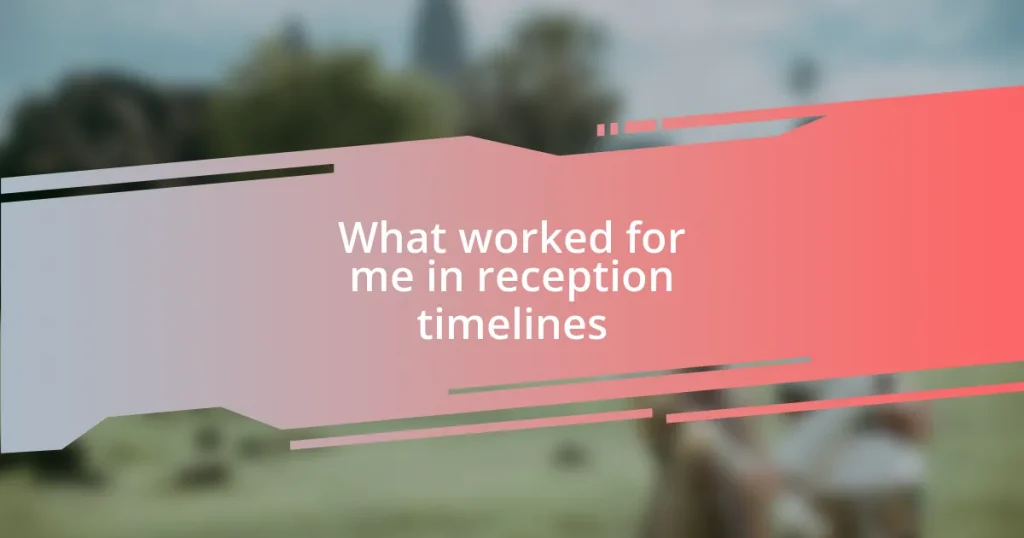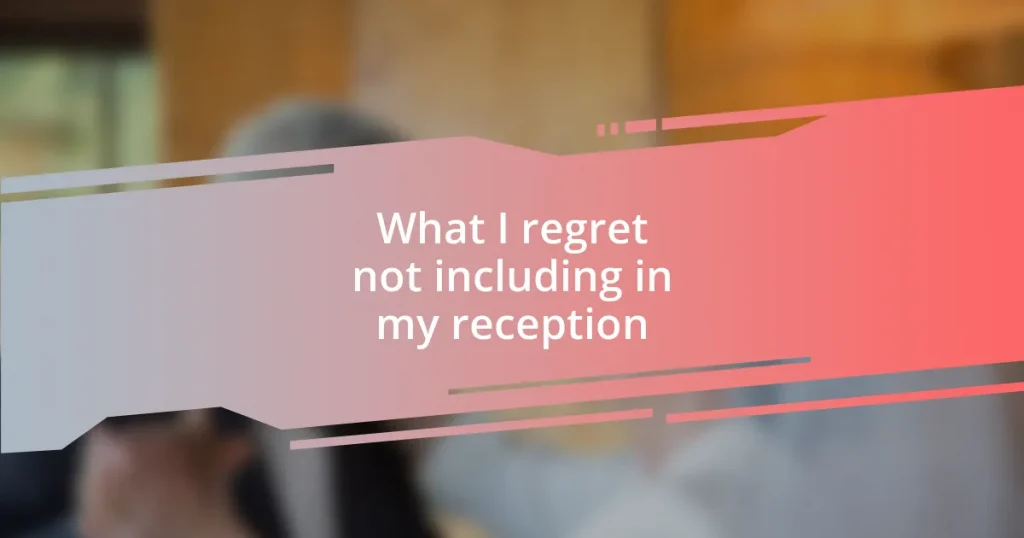Key takeaways:
- Setting clear travel goals helps streamline budgeting and prioritizes spending for meaningful experiences.
- Identifying and categorizing travel expenses allows for better financial management and unexpected savings opportunities.
- Creating and adjusting a flexible travel budget can enhance the travel experience by accommodating spontaneous opportunities and managing unforeseen costs.
- Establishing a dedicated savings plan and cutting back on daily luxuries can effectively fund future travels.

Setting Clear Travel Goals
Setting clear travel goals is essential for effective budgeting. When I decided I wanted to visit Italy for my 30th birthday, I didn’t just dream about the pasta and sights; I crafted a detailed list of places I wanted to explore and experiences I wanted to have. This clarity transformed my budgeting process, as each goal helped dictate potential costs and savings strategies.
Have you ever found yourself overspending because you didn’t have a specific destination in mind? I certainly have. I once made the mistake of just picking a random getaway and ended up splurging on things I didn’t really care about. But when I focused on specific activities—like taking a cooking class in Tuscany—I was able to save precisely for that experience, which made the trip memorable and impactful.
Establishing a mix of short-term and long-term goals can add variety to your adventures. As I planned my travels, I set a long-term goal of visiting all seven continents by age 40. Simultaneously, I also adjusted my budget for smaller, more spontaneous trips to nearby cities. This dual approach kept my enthusiasm alive, whether I was saving for a major journey or enjoying a weekend escape. Isn’t it rewarding to know that each little trip adds to a broader adventure?

Identifying Travel Expenses
Identifying travel expenses can feel daunting, but breaking it down makes it manageable. I’ve learned to categorize my expenses into major groups like transportation, accommodation, food, and activities. For instance, understanding that flights can take up 50% of my budget if not planned well made me more proactive in tracking flight prices weeks in advance.
Every trip has its unique costs, and it helps to create a personalized list. When I traveled to Japan, I realized that local transport was a significant part of my budget. I committed to using public transit and even walked to some attractions. This not only saved money but allowed me to experience the city’s culture on foot, making the trip even more enriching.
After pinpointing these expenses, I often surprise myself with how much I can save by simply adjusting my choices. On a recent trip to Iceland, I opted for a cozy Airbnb instead of a hotel. I cooked meals, which not only fed my adventurous spirit but also left me with extra funds to splurge on a memorable Northern Lights tour. Have you tried reallocating funds in this way? It can lead to unexpected opportunities!
| Expense Category | Typical % of Budget |
|---|---|
| Transportation | 30-50% |
| Accommodation | 20-40% |
| Food | 10-25% |
| Activities | 15-30% |
| Miscellaneous | 5-10% |

Creating a Travel Budget
Creating a travel budget starts with knowing your limits and understanding what you truly want from your trip. I remember the excitement I felt planning a road trip along the Pacific Coast Highway; however, it quickly turned into a challenge when I realized how fluid my spending could be. By setting a firm budget, I was able to enjoy the breathtaking views without constantly worrying about overspending on gas or snacks. I always look at it this way: a budget isn’t a restriction; it’s a framework that allows for joyful exploration.
Here are some key steps I take when crafting my travel budget:
- Determine your total budget: Assess your available spending money without compromising other necessities.
- Break it down by categories: Allocate funds for transportation, accommodation, food, activities, and souvenirs.
- Account for surprises: Set aside an extra 10% for unexpected costs; this provides peace of mind.
- Prioritize experiences: Consider what activities mean the most to you, and be willing to adjust other areas to accommodate them.
- Review and adjust: Monitor your spending as the trip unfolds and make changes as needed to stay on track.
By following these steps, I’ve learned to relish both the meticulous planning and spontaneous adventures that come with travel. It’s a delightful balance that makes each journey feel like a win.

Finding Discounts and Deals
Finding discounts and deals can transform your travel experience from ordinary to extraordinary. One technique that has consistently worked for me is signing up for fare alerts from various travel sites. On my last trip to Europe, I received an email alert about a flash sale on flights to Paris. It felt like the universe was whispering, and I jumped on it—saving nearly 30%! Have you ever had a travel opportunity land in your inbox just when you needed it?
I also love using travel reward programs. I remember using points I’d accumulated from my everyday expenses, which allowed me to purchase a round-trip ticket to Thailand for just a small fee in taxes. Utilizing credit card rewards has been a game-changer. It’s fascinating how the little purchases I make every day can lead to incredible travel adventures. Have you checked if your card has similar benefits?
Don’t underestimate social media either. Following travel bloggers and deal accounts can expose you to exclusive discounts. Once, I stumbled across a deal on Instagram for a week-long stay in a luxurious coastal villa for half the price. I just couldn’t pass up that chance! Engaging with a community focused on travel deals can make all the difference in budgeting your adventures. What deals have you discovered through social media? You might find treasures you never knew existed!

Tracking Your Spending
Tracking your spending while traveling can be a game changer for ensuring you stay within your budget. Personally, I find it incredibly helpful to use a mobile app that lets me enter expenses in real time. I remember during my backpacking trip through Southeast Asia, I started tracking my daily spending right after breakfast. It was eye-opening to see how small indulgences, like that extra iced coffee, all added up by the end of the day. Have you ever had a moment where you realized something small was eating away at your budget?
Another technique I use is to categorize my spending daily. For instance, I once created a simple spreadsheet where I listed categories like food, transportation, and activities. I was surprised to discover that my dining expenses were higher than planned, which prompted me to seek out local markets for meals instead. This not only saved money but also enriched my travel experience with unique flavors. How do you keep track of your spending? Finding what works best for you can turn tracking into a positive experience rather than a chore.
Finally, I maintain a physical record of my expenses, like a small notebook I carry in my pocket. There’s something satisfying about jotting down each purchase, which for me feels like a connection to my journey. One time, I even doodled next to some expenses, remembering the laughter shared over a meal or a new friend made along the way. It reminds me that tracking isn’t just about numbers; it’s about the stories those numbers tell. Have you considered capturing your travel tale through your spending? It could add an engaging layer to your adventures.

Adjusting Your Budget
I’ve learned that adjusting your budget while traveling is essential for managing unexpected expenses. There was a time I found myself in Florence with a sudden need for a train ticket to Rome, and I realized my budget was tighter than I thought. It was a wake-up call! I pulled out my travel app and rearranged my spending, cutting back on souvenirs and opting for a gelato instead. Have you ever had to prioritize spontaneous experiences? It can actually lead to some of the most memorable moments.
Another way I adjust my budget on the fly is by being flexible with my accommodation. One evening in Barcelona, I had planned to stay at a fancy hotel. Yet, when I saw a cozy, local Airbnb just a few blocks away at half the price, I couldn’t resist. It not only saved me money but also gave me a more authentic experience mingling with local hosts. It’s fascinating how a little flexibility can open up so many doors. Have you ever made a last-minute decision that turned out to be the highlight of your trip?
Ultimately, I believe that regularly reviewing and adjusting your budget is a vital part of the travel process. On a trip to Japan, I had set aside a budget for activities, but I discovered I wanted more time to explore local parks and festivals instead of costly tours. By shifting funds from activities to local experiences, I created cherished memories that I wouldn’t trade for any overpriced experience. How do you feel about re-prioritizing expenses? Embracing that kind of flexibility can transform your travels from routine to unforgettable.

Saving for Future Trips
Saving for future trips can feel daunting, but I’ve discovered it can also be incredibly rewarding. I like to set up a dedicated savings account for travel, where I automatically transfer a set amount each month. It’s like a little reminder that those adventures are just around the corner, and watching that fund grow gives me a thrill! Have you ever felt that rush when you see your savings increase? It’s a motivating experience that keeps the travel dreams alive.
To enhance my travel fund, I often engage in casual side hustles, like freelance writing or selling unused items online. I remember one summer, I decluttered my home and made enough to cover a nice weekend getaway. Not only did I clear space, but it was also exhilarating to see how easy it was to turn unwanted items into something tangible—like travel memories! Have you thought about how much your unused belongings could contribute to your next adventure?
Additionally, I find that cutting back on everyday luxuries can add up quickly. One habit I adopted was to limit my dining-out expenses, which freed up a surprising amount for my travel fund. I recall a time when I decided to cook at home more frequently; it felt like a small sacrifice but resulted in an extra trip to the beach the following month. It’s all about prioritizing what brings you joy. What are you willing to give up to experience something new? The answer can lead to your next adventure.















